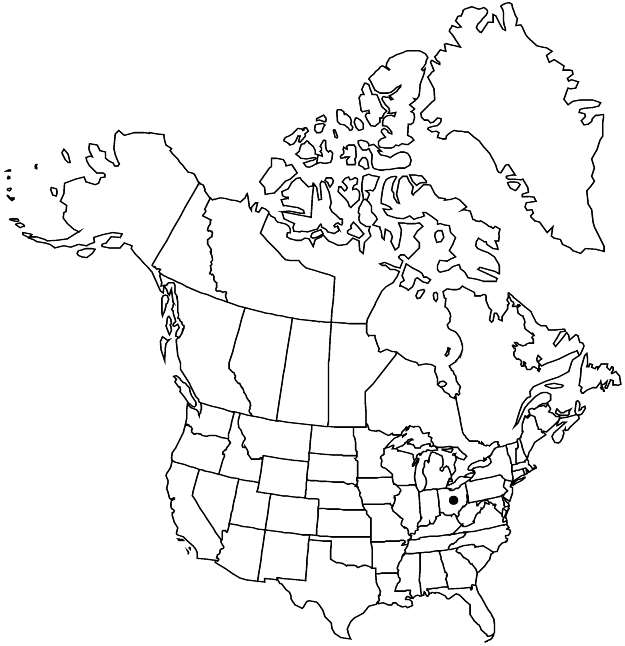Difference between revisions of "Moehringia trinervia"
Man. Herbor. Suisse, 150. 1811.
FNA>Volume Importer |
imported>Volume Importer |
||
| (2 intermediate revisions by 2 users not shown) | |||
| Line 8: | Line 8: | ||
}} | }} | ||
|common_names=Three-nerved sandwort | |common_names=Three-nerved sandwort | ||
| + | |special_status={{Treatment/ID/Special_status | ||
| + | |code=I | ||
| + | |label=Introduced | ||
| + | }} | ||
|basionyms={{Treatment/ID/Basionym | |basionyms={{Treatment/ID/Basionym | ||
|name=Arenaria trinervia | |name=Arenaria trinervia | ||
| Line 30: | Line 34: | ||
|elevation=400 m | |elevation=400 m | ||
|distribution=Ohio;Eurasia. | |distribution=Ohio;Eurasia. | ||
| + | |introduced=true | ||
|discussion=<p><i>Moehringia trinervia</i> was collected near Cleveland in 1990 on property that formerly was a resort community (R. K. Rabeler and A. W. Cusick 1994). It closely resembles <i>Stellaria media</i>; the multiveined, ciliate leaves, retrorse pubescence in two lines on the stems, broadly scarious sepals, capsules shorter than the sepals, and smooth, appendaged seeds distinguish it from <i>S. media</i>.</p> | |discussion=<p><i>Moehringia trinervia</i> was collected near Cleveland in 1990 on property that formerly was a resort community (R. K. Rabeler and A. W. Cusick 1994). It closely resembles <i>Stellaria media</i>; the multiveined, ciliate leaves, retrorse pubescence in two lines on the stems, broadly scarious sepals, capsules shorter than the sepals, and smooth, appendaged seeds distinguish it from <i>S. media</i>.</p> | ||
|tables= | |tables= | ||
| Line 53: | Line 58: | ||
|publication title=Man. Herbor. Suisse, | |publication title=Man. Herbor. Suisse, | ||
|publication year=1811 | |publication year=1811 | ||
| − | |special status= | + | |special status=Introduced |
| − | |source xml=https:// | + | |source xml=https://bitbucket.org/aafc-mbb/fna-data-curation/src/2e0870ddd59836b60bcf96646a41e87ea5a5943a/coarse_grained_fna_xml/V5/V5_153.xml |
|subfamily=Caryophyllaceae subfam. Alsinoideae | |subfamily=Caryophyllaceae subfam. Alsinoideae | ||
|genus=Moehringia | |genus=Moehringia | ||
Latest revision as of 22:09, 5 November 2020
Plants annual (or short-lived perennial?), not rhizomatous. Stems prostrate or ascending, branched, angled or grooved, 13–19 cm, retrorsely pubescent in 2 lines. Leaves petiolate; petiole 1–4 mm; blade 3(–7)-veined, ovate to broadly ovate, 5–18 × 4–8 mm, margins ciliate, apex acute. Inflorescences 3–10(–15)-flowered; bracts 1–15 mm, proximal foliaceous, distal much smaller, scarious. Pedicels ascending to erect, recurved in fruit, 4–15(–22) mm. Flowers: sepals 4 or 5, midrib keeled, ovate-lanceolate, 2–4 mm, margins broad, apex acuminate; petals 4 or 5, ca. 1.3 mm, ca. 1/2 as long as sepals. Capsules ovoid, 2–2.5 mm, shorter than sepals. Seeds reniform, 1 mm, smooth. 2n = 24 (Europe).
Phenology: Flowering early summer.
Habitat: Trails in forests
Elevation: 400 m
Distribution

Introduced; Ohio, Eurasia.
Discussion
Moehringia trinervia was collected near Cleveland in 1990 on property that formerly was a resort community (R. K. Rabeler and A. W. Cusick 1994). It closely resembles Stellaria media; the multiveined, ciliate leaves, retrorse pubescence in two lines on the stems, broadly scarious sepals, capsules shorter than the sepals, and smooth, appendaged seeds distinguish it from S. media.
Selected References
None.